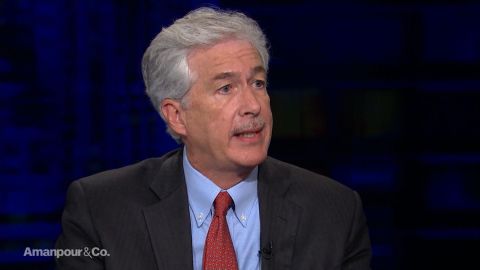Read Transcript EXPAND
CHRISTIANE AMANPOUR: The United States has done something, I mean, kind of incredible. It has withdrawn all its funding for civilian, humanitarian programs that help the Palestinians, whether it’s the U.N.-related ones or whether its to NGOs, that means non-governmental organizations, programs like helping Palestinian and Israeli girls play soccer together, in other words, bridge building, tension reducing kinds of programs. How is that going to help bring the Palestinians to the peace table or tamp down the real tensions in that area, because Jared Kushner, he believes that punishing the Palestinian civilians will enable peace not stall it.
WILLIAM BURNS, FORMER U.S. DEPUTY SECRETARY OF STATE: Well, I just think that’s flawed approach. I think it’s politically counterproductive and I think it’s morally bankrupt to cut the kinds of assistance that you described before. I think it’s based on the false premise that you can punish the Palestinians into accepting something less than a real state. And I think it’s also based on a number of other notions that somehow, over time, you can rent the acquiescence of Palestinians by offering a sense of economic possibilities to which the Saudis or others might contribute. And as you know very well, that the court here has a sense of political dignity and I don’t think Palestinians are going to be bought off. There’s also the flawed premise that somehow you can go over the headd of the Palestinians and at the Saudis and others in the Arab world who share Israel’s concern about Iran are going to make concessions with regard to Israeli/Arab peace and kind of ignore the Palestinians. I think that’s flawed too.
AMANPOUR: I mean, it does look and there’s plenty of articles around it and plenty of evidence around it, that this particular Israeli government sees a sort of a light-minded, a kindred spirit in Donald Trump and is doing a lot to push American foreign policy, which is pushing America out of the role of honest broker. Where do you come down on this? How much o4 an influence does Benjamin Netanyahu have when it comes to Iran policy or, obviously, Israel Palestine policy, the Gulf policy, you know, American policy?
BURNS: Well, I think there’s a confluence of interest, obviously, over Iran, over the Palestinian issue right now. But as someone who for a very long time has been a very strong supporter of Israel, I think as friends, we need to be honest. And what I fail to see is how Israel’s long-term security interest, it’s interest in sustaining what’s so important, which is its existence and health and prosperity as a Jewish democratic state can be preserved when Jews are in the minority in the land Israel controls from the Jordan river to the Mediterranean. I just think, you know, demography and the politics that flows from that create realities we need to pay attention to.
About This Episode EXPAND
Christiane Amanpour interviews William Burns, Former U.S. Deputy Secretary of State; and Sally Field, actress and author of”In Pieces.” Alicia Menendez interviews Jose Antonio Vargas, author of “Dear America” and founder, Define American.
LEARN MORE


